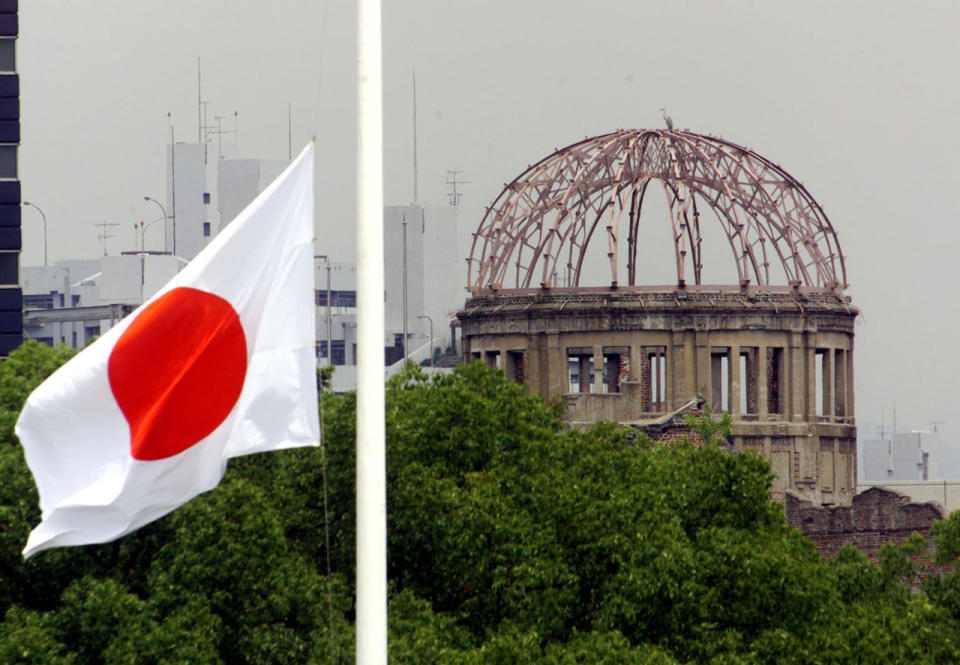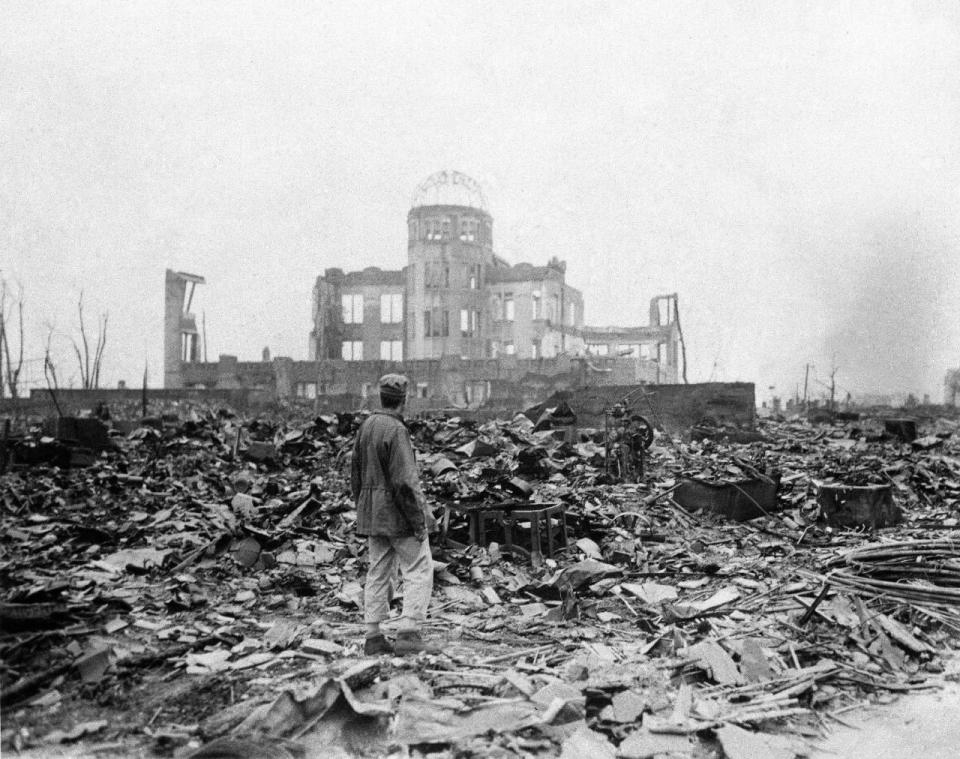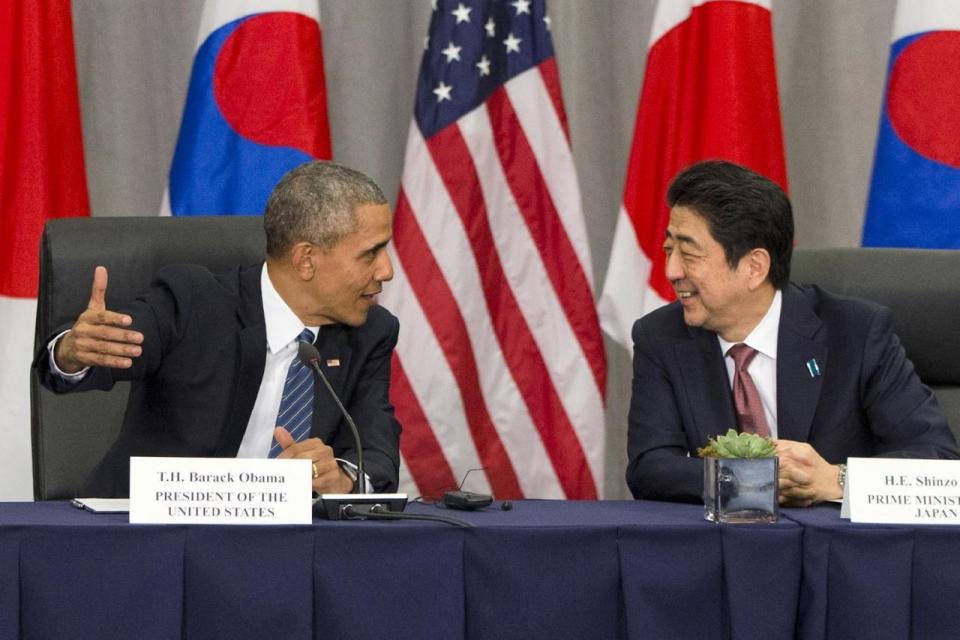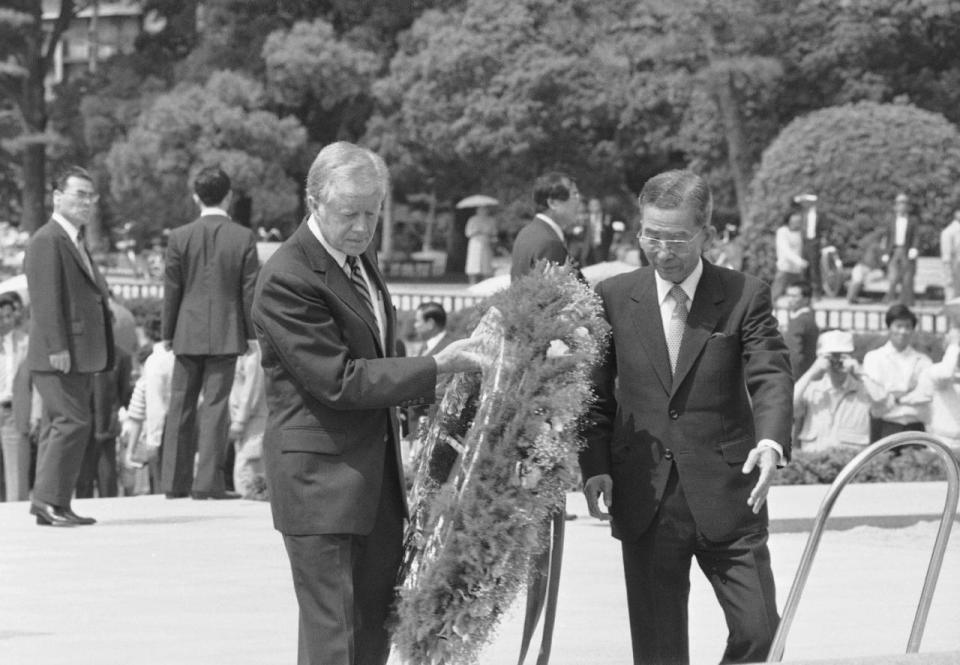Hiroshima visit by Obama doesn’t rouse much backlash
There was good reason for the White House to brace itself for criticism after announcing President Obama’s scheduled visit to Hiroshima Peace Memorial Park in Japan — but it didn’t come.
Obama is set to become the first sitting U.S. president to visit Hiroshima, the first of two cities the U.S. struck with atomic bombs in 1945, helping to end World War II.
Considering how much flak Obama has taken from conservative pundits and Republican politicians for what they characterize as his “apologies” for American foreign policy, the voices of derision were conspicuously silent throughout the day.
Perhaps such criticism was preempted by the White House’s strategic announcement that Obama will not apologize for then-President Harry Truman’s decision to drop the bomb, and that the visit does not diminish the sacrifice and service of World War II veterans.
The muted response might also reflect the American public’s changing opinions about this major 20th century cause célèbre. A survey by the Pew Research Center, a nonpartisan U.S. think tank, found that only 56 percent of Americans consider the bombing justified, and 34 percent said it was not. A Gallup Poll taken immediately after the bombing in 1945 found that 85 percent of Americans approved of using the atomic bomb against Japanese cities.
On Tuesday morning, Democratic politicians heaped lavish praise on the commander in chief for planning to visit the site of the first nuclear weapon used in war. The visit will take place on May 27 after the G-7 Summit in Japan.

The national flag of Japan flutters at half-mast near Hiroshima Peace Memorial Park in western Japan in 1998. (Photo: Kimimasa Mayama/Reuters)
For 70 years, scholars and laymen alike have debated the ethics surrounding the atomic bombings of Hiroshima and Nagasaki — divided between those who argue the bombings were preferable to a land invasion and those who argue they were inherently immoral and tantamount to a war crime.
House Minority Leader Nancy Pelosi, D-Calif., who visited Hiroshima as speaker of the House in 2008, released a statement saying the visit is a testament to Obama’s “bold and principled leadership.”
“President Obama has been a tireless leader in the global effort to prevent the spread of nuclear weapons, and I commend him and the Administration for their strong focus on this vital challenge for global peace and security,” it reads in part.
“The President’s visit also underscores the monumental progress of the friendship between the United States and Japan since the war. It also reflects the relationship between President Obama and Prime Minister Shinzo Abe. Together, our nations will continue to lead on non-proliferation.”
Sen. Edward J. Markey, D-Mass., released a statement recalling his visit to Hiroshima in 1985 on the bombing’s 40th anniversary. He said our ultimate “goal today, tomorrow and always” should be a future without nuclear weapons.
“I recognize the importance of President Obama’s decision to be the first sitting President to finally visit Hiroshima,” Markey wrote. “His visit provides an historic opportunity to exercise American leadership around the globe by committing to cut our own spending on outdated and unnecessary nuclear weapons that we no longer need to keep us safe.”

An allied correspondent stands amid the rubble in front of what once was a movie theater in Hiroshima, Japan, a month after the first atomic bomb ever used in warfare was dropped by the U.S. on Aug. 6, 1945. (Photo: Stanley Troutman/AP)
Rep. Barbara Lee, D-Calif., described the visit as historic on Twitter: “We must recommit to choosing peace over war - starting with nuclear disarmament.”
Similarly, Rep. Mark Takano, D-Calif., tweeted, “I applaud @POTUS decision to visit Hiroshima. It’s a poignant reminder of our responsibility to lead the way to a nuclear-free world.”
Commenting on a note to Truman that described the bombing as a “success,” Kenneth Roth, the executive director of Human Rights Watch, tweeted, “Hiroshima was obviously no ‘success’ for the civilians targeted. No civilian should be.”
When Yahoo News posted an article on Facebook about the upcoming visit, several readers criticized Obama and expressed trepidation about the visit.
“The apology tour continues!” one wrote.
“He better not apologize for the bomb,” another said. “There would have been no Hiroshima if there had not been a Pearl Harbor.”
Last month, a group that commemorates former prisoners of war in Japan during World War II (the American Defenders of Bataan and Corregidor Memorial Society) wrote an open letter to President Obama urging him to postpone a visit to Hiroshima until he makes “an equally poignant memorialization of the Americans who perished in Japan.”
Obama, who was criticized for a so-called “apology tour” when he reached out to the Muslim world during his first year in office, wants the visit to convey his commitment to nonproliferation and remembrance of civilians killed in wartime — not an apology on behalf of the nation, according to his staff.
Josh Earnest, the White House press secretary, said Tuesday afternoon that it is all right for Americans to debate whether or not Truman made the right decision to drop the bomb — but that it is hard to second-guess him.

President Obama speaks with Japanese Prime Minister Shinzo Abe at the Nuclear Security Summit in Washington in March. (Photo: Jacquelyn Martin/AP)
When asked if there was any concern that the visit would be interpreted as an apology, Earnest replied, “If people do interpret it that way, they’d be interpreting it wrongly. So, I don’t think there’s much risk of that.”
Anticipating this controversy, Ben Rhodes, the deputy national security adviser for strategic communication at the White House, explained in a post on Medium early Tuesday that Obama will not revisit the decision to drop the atom bomb, but focus instead on moving forward toward a future of peace.
He said the United States will be “eternally proud” of the civilian leaders and World War II veterans who served “at a time of maximum peril to our country and our world.”
“Their cause was just, and we owe them a tremendous debt of gratitude, which the President will again commemorate shortly after the visit on Memorial Day,” Rhodes wrote. “This visit will offer an opportunity to honor the memory of all innocents who were lost during the war.”
Some within Japan fear that an apology could galvanize antinuclear groups within Japan and possibly set off a string of apologies for World War II with unintended political consequences.
Last summer, the Japanese prime minster expressed “grief” for the suffering that Japan inflicted during World War II, but said future generations in Japan should not have to keep apologizing for the war crimes of their forebears.
The “Little Boy” atomic bomb dropped on Hiroshima on Aug. 6, 1945, instantly killed an estimated 80,000 people. In the ensuing years, tens of thousands died from the radioactive fallout. The U.S. Department of Energy says the five-year death toll may have reached or exceeded 200,000.

In May 1984, guided by then-Hiroshima Mayor Takeshi Araki, former President Jimmy Carter places a wreath at the memorial cenotaph, a monument that contains the names of those who died in the 1945 atomic bombing of Hiroshima. (Photo: Katsumi Kasahara/AP)
In 2009, the Norwegian Nobel Committee highlighted Obama’s promotion of a world without nuclear weapons as a reason for awarding him that year’s Nobel Peace Prize.
“World War II was a conflict in which the total number of civilians who died exceeded the number of soldiers who perished,” Obama said during his acceptance speech in Oslo, Norway. “In the wake of such destruction, and with the advent of the nuclear age, it became clear to victor and vanquished alike that the world needed institutions to prevent another world war.”
Susan Rice, the president’s national security adviser, tweeted on Tuesday that the “visit will be forward-looking, underscoring our nonproliferation agenda & stalwart alliance with Japan.”
Recently, U.S. Ambassador Caroline Kennedy and Secretary of State John Kerry have visited Hiroshima. Former President Jimmy Carter visited the city in 1984, three years after leaving office.
Since the conclusion of World War II, the United States and Japan have enjoyed strong political and military alliances and economic partnerships. Today, Japan is one of the most pro-U.S. countries in the world; the majority of its people view the United States as a force for good in the world.

